miércoles, 27 de febrero de 2013
Oil Retail sales: Shoppers pulled back at the holidays
Oil Retail sales: Shoppers pulled back at the holidays CNNMoney.comBy Chris Isidore | CNNMoney.com Consumers pulled back on their spending in December despite the holiday shopping season, according to a government report released Thursday. The Commerce Department report showed that overall retail sales rose only 0.1% compared to November -- falling short of forecasts of economists surveyed by Briefing.com, who were expecting a 0.4% rise. Excluding auto sales, which were relatively strong in the month, sales fell 0.2%; compared to forecasts of a 0.3% rise. Part of the reduced spending came from lower prices. Lower gasoline prices trimmed spending at gas stations by 1.6% compared to November. And spending at grocery stores also declined 0.2% in the same period amid reports of some lower food prices. Paul Dales, senior U.S. economist for Capital Economics, said it was somewhat positive that lower prices allowed non-discretionary spending to decline 0.6%, at the same time that discretionary spending rose 0.4%. 'It appears they're saving money when they go to fill up their cars, and spending it on something more enjoyable,' he said. But there were also declines in some retail categories that typically get a lift from holiday shoppers. The biggest was a 3.9% drop at electronic and appliance stores. Department store sales also fell 0.2%, leading to a 0.8% drop in general merchandise stores. Non-store retailers, typically online retailers, suffered a 0.4% drop. Mark Vitner, senior economist with Wells Fargo Securities, said his firm's measure of 'core' sales -- which excludes autos, gas stations and building materials -- posted the first monthly decline in a year. These excluded sectors are heavily influenced by volatile prices or by the business cycle. 'The decline here gets our attention,' he said. 'We do not think the consumer is completely going into hiding, but we do think that the pace of consumer spending growth is poised to slow.' Economists said that with other economic readings showing that stagnant wages were not keeping up with prices overall, and rising credit card balances, there's a limit in how much consumers will be able to spend -- even as a declining savings rate suggested that consumers were more willing to dip into savings. 'Households have realized that the savings only go so far,' said Dales. Disappointing December spending left overall sales up 6.5%, compared to 6% a year earlier which excludes auto sales. Bucking the trend were clothing retailers, which enjoyed a 0.7% rise in spending; and a 1.6% rise at building material and garden equipment retailers, which Dales said may have been helped by unusually mild weather. View this article on CNNMoney
miércoles, 13 de febrero de 2013
Earn Citigroup cut investment bank bonuses by 30 percent: report
Earn Citigroup cut investment bank bonuses by 30 percent: report (Reuters) - Citigroup (NYSE:C - News) has cut bonuses for its investment banking division by about 30 percent on average, Bloomberg said, citing a person briefed on the matter. Some businesses within the securities and banking unit had bonuses reduced by as much as 70 percent, Bloomberg reported. Citigroup was not immediately available for comment. (Reporting by Abhiram Nandakumar in Bangalore; Editing by Steve Orlofsky)
martes, 12 de febrero de 2013
Earn Lot of good setups
Earn
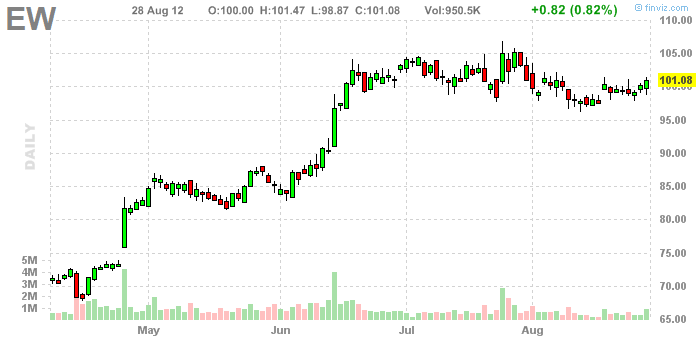
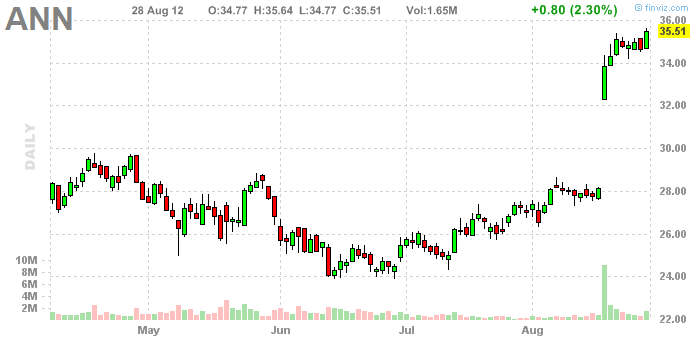
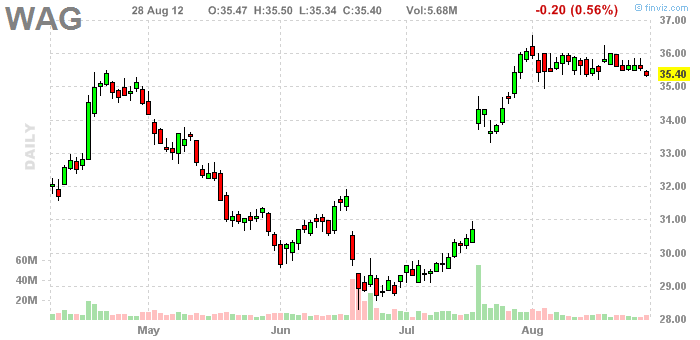
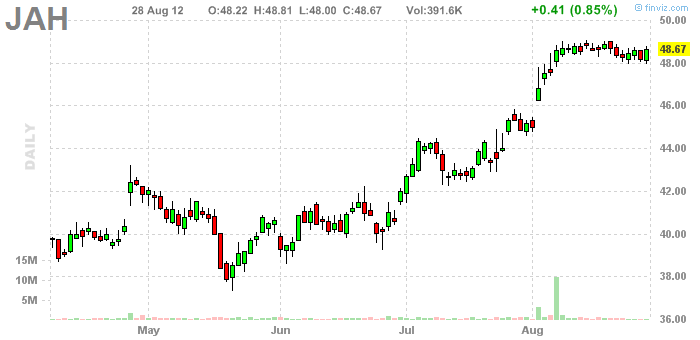
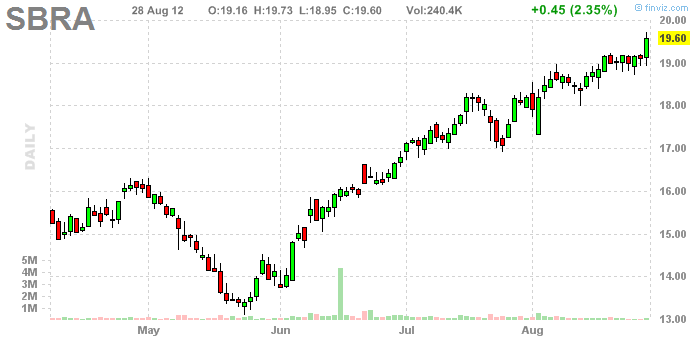
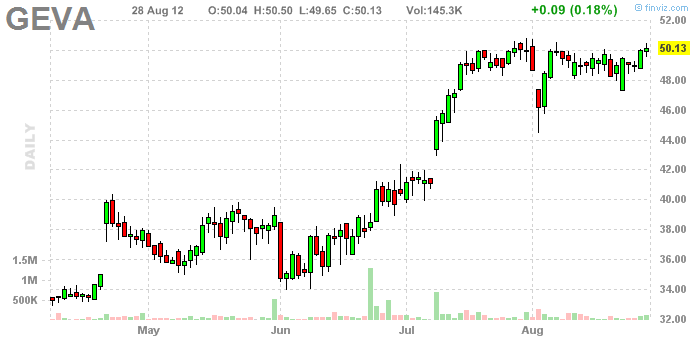
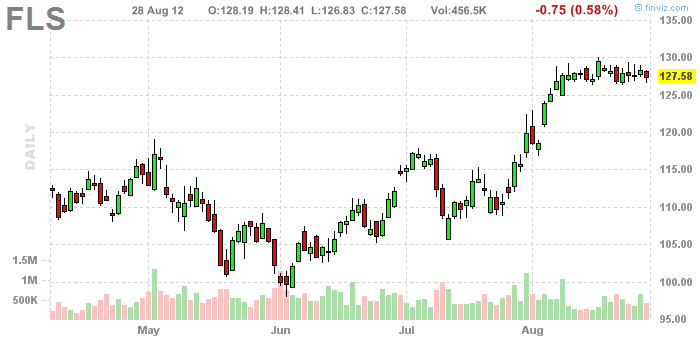
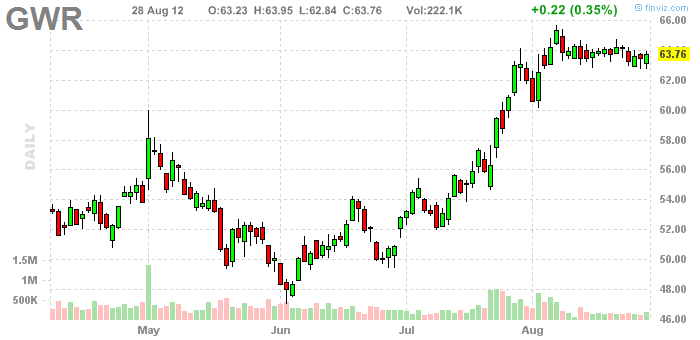


As market continues to consolidate near high, lot of new setups are emerging. EW, ANN, WAG, JAH, SBRA, GWR, FLS, and GEVA are few examples of these kind of setups.
If you see the top ranked 10% stocks by momentum , you will see lot of these kind of setups.








lunes, 11 de febrero de 2013
Oil Glass is still half full for flush American farmers
Oil Glass is still half full for flush American farmers WASHINGTON (Reuters) - Brian Roach scrawled a simple outlook for corn prices in a spiral notebook, with a line diving from the upper left hand corner to the lower right. Sitting in a hotel ballroom at the U.S. Department of Agriculture's annual Agricultural Outlook Forum last week, the commodity broker predicted increasing supplies and weakening demand would slow a boom in the farm economy that has fattened growers' wallets and pushed up food prices. 'Nothing is telling me to think any different right now,' said Roach, president of the Florida-based commodity business Roach Ag Marketing. For the first time in years at the conference that traditionally kicks off the year for America's agri-business sector, forecasters said the seemingly endless upward trajectory on everything from crop prices to farmer income was coming to an end. The price of corn, the big daddy of the major U.S. crops, could fall 20 percent this year and because of expanding production globally, the corn stockpile would double. It is a significant shift after corn prices reached a record high near $8 a bushel last summer on concerns about strong demand draining inventories. The surge in prices is expected to encourage an expansion in planting of crops this year. Farmers are becoming 'very pragmatic about the investments they're making in machinery, equipment and input costs' after spending freely following last autumn's profitable harvest, said Thomas Dorr, president of the U.S. Grains Council. Many built new storage bins and upgraded their tractors and combines. Moving forward, 'the mood is one of caution,' Dorr said. To be sure, farmers are flush with cash after farm income topped $100 billion for the first time in 2011 as the rural economy rebounded from the pothole of the global recession. Even if income slumps to $96.3 billion this year due to larger world and domestic supplies as predicted by the government, farmers and ranchers would be looking at their second-best year ever. Income would remain well above the 10-year average. 'Prospects for U.S. agriculture continue to be strong with record income in 2011 and a strong balance sheet,' said Joe Glauber, the USDA chief economist. Still, there was a sense of deja vu of 2008 at the conference that attracts some 2,000 attendees. That year, farmers enjoyed sky high prices for their crops but marching in lockstep, was the price of crude oil. The recent spike in fuel prices could again add pressure to the farm economy. Energy costs squeeze farmer margins because they depend heavily on tractors, combines, pesticides and fertilizers -- which track the price of fuel -- to get most out of their land. 'Energy costs to a farmer are obviously a serious concern,' said David Berg, president of the American Crystal Sugar Company, based in Moorhead, Minn. 'It's almost like a few years ago where everyone was in a state of panic.' He said sugar beet farmers in Minnesota and North Dakota are doing well but a double whammy of lower prices on the market for the commodity and higher energy prices would be hard to swallow for a number of growers. 'The price of sugar is high enough so that an increase in energy costs is a negative for them, but it's not going to put them under water,' Berg said. 'If the price of sugar goes down from where it is today, it will very likely put some of them under water.' Tyson Foods also is worried about rising fuel costs, with Chief Executive Donnie Smith warning the recent jump in gas prices could dent demand for beef by reducing disposable income of consumers. Beef prices have reached record levels due to a historic drought that reduced cattle herds in the southern Plains and high prices for corn that is fed to livestock. 'You're not moving as much volume of meat but you're paying more for it,' Smith told reporters at the conference. A drop in demand for meat could hurt livestock producers even as increased grain production would cut their feed costs. Farmers are expected to go all out to get their seeds in the ground this spring, especially with the mild winter that is now coming to a close. The USDA estimates they will plant 94 million acres (38 million hectares) of corn, about 2 million acres more than last year and the largest area since 1944. Still, Jon Caspers, a producer of about 8,000 hogs a year in Iowa, is not breathing a sigh of relief due to high gasoline prices and lingering uncertainty about demand. He's also unsure farmers will plant as much corn as expected. Last year, heavy spring rains dashed their plans to plant from fence post to fence post. 'A lot of producers are waiting to see if it really happens,' he said. (Additional reporting by Charles Abbott; Writing by Russ Blinch; Editing by Marguerita Choy)
Signals U.S. did not call for strategic oil release: G20 sources
Signals U.S. did not call for strategic oil release: G20 sources U.S. Treasury Secretary Timothy Geithner (C) and Chairman of Grupo Financiero Banorte Guillermo Ortiz (L) arrive to a meeting of Group of Twenty (G20) leading economies' finance ministers and central bankers in Mexico City February 25, 2012. REUTERS/Tomas Bravo MEXICO CITY, Reuters (Feb 25) - The United States did not openly call for a release of countries' strategic oil reserves during Group of 20 meetings this weekend, Group of 20 sources said on Saturday. Treasury Secretary Timothy Geithner said on Friday the United States is considering a release from its strategic oil reserves as rising tensions between Iran and the West over its disputed nuclear program fueled a rise in oil prices. At meeting of G20 economies on Saturday, two people familiar with the discussion said finance officials had discussed the risk to the world economy from oil prices, which rose above $125 a barrel on Friday, but the United States did not push for a release of strategic reserves. Countries hold oil reserves as a buffer against sudden drops in supply. A draft communique for the G20 meeting, which is still under discussion, said high oil prices were a risk to the global economy, the sources said, although the outlook was cautiously optimistic. 'The communique says that there are some positive signs in the global economy, coming especially from the U.S. economy, but they are tentative,' one G20 official said. (Reporting by Francesca Landini and Dave Graham; Writing by Krista Hughes)
martes, 5 de febrero de 2013
Forex Student Loan Crisis Looms: FICO Risk Survey
Forex Daily Ticker Despite recent headlines cheering positive trends in the economy, there is still much to be concerned about, according to FICO's new quarterly survey of bank risk professionals. More than two-thirds of risk managers are seriously concerned about the debt loads held by students in the country. 67% of respondents believe delinquencies of student loans will rise, up a considerable 19% from the previous survey. 'They are worried about the amount of student loans that are out there and the ability of those students to repay them,' says Mark Greene, CEO of FICO, which provides credit scores used by both consumers and creditors and is widely considered the industry standard. With tuition prices on the rise each and every year, it is no surprise that the total amount borrowed is also on the upswing. The student who graduated in the class of 2009 had an average of $24,000 in student loans. But that's just the average. Some students are accountable for sums totaling $100,000. (See: The Economic Agony of Today's Twenty-Somethings) The Federal Reserve reported last year that student debt has actually surpassed credit card debt and predicts the total amount owed has topped $1 trillion. Greene's advice to students is: 'Be careful what you borrow.' 'Clearly education has a great return on investment so there is no suggestion you should avoid taking out loans, but be careful what you are getting into,' he says. 'Manage your student loans as carefully as you would your mortgage, your credit card or something else.' Other problem areas listed in the survey include credit card debt and mortgage debt. Credit card debt increased 8.5% to $5.6 billion in November from October, the biggest gain since March 2008. 45% of risk managers surveyed expect credit card delinquencies to rise while 21% expect a decline. And 54% of respondents believe credit card balances will rise. Those figures are more pessimistic than the previous quarter. As for mortgage debt, 47% of risk managers predict mortgage delinquencies will rise while 13% expect to see a decrease. 'If you are looking for risk managers to declare that we've turned the corner, they are not declaring that yet,' says Greene. Do you think the economy is improving or still has a long way to go? More from The Daily Ticker: Forget Harvard and a 4-Year Degree, You Can Make More as a Plumber in the Long Run, Says Prof. Kotlikoff Brain Drain: Most College Students Learn Next to Nothing, New Study Says Jame's Altucher's 8 Alternatives to College Related Quotes: ^GSPC 1,292.18 -0.30 -0.02% BAC 6.76 -0.11 -1.60% C 31.36 +0.09 +0.29% GS 98.96 -0.80 -0.80% JPM 36.44 -0.22 -0.60% WFC 29.54 -0.08 -0.29% PNC 61.51 +0.21 +0.34% FAZ 31.80 +0.23 +0.72% FAS 75.30 -0.53 -0.70% XLF 13.83 -0.04 -0.26% ^DJI 12,432.54 -16.91 -0.14% DFS 26.16 +0.30 +1.16% V 100.99 +1.88 +1.90% MA 342.76 +1.29 +0.38% MS 16.92 -0.18 -1.05%
Forex Lloyds chief executive skips annual bonus
Forex LONDON (AP) -- The chief executive of Lloyds Banking Group, which was rescued by British taxpayers during the credit crisis, says he won't take his annual bonus for 2011. Antonio Horta-Osorio said Friday he's doing that because he took a leave of absence, not specifically in response to Prime Minister David Cameron's recent call for restraint on executive pay. Horta-Osorio took two months off last year as he suffered from sleeping problems. He did not disclose the amount in a bonus that he is turning down, but said future payments should take into account Britain's 'tough financial circumstances.' His pay and bonus entitlement will be disclosed next month in the group's annual report. British taxpayers still hold a 40 percent stake in the bank.
Suscribirse a:
Entradas (Atom)
